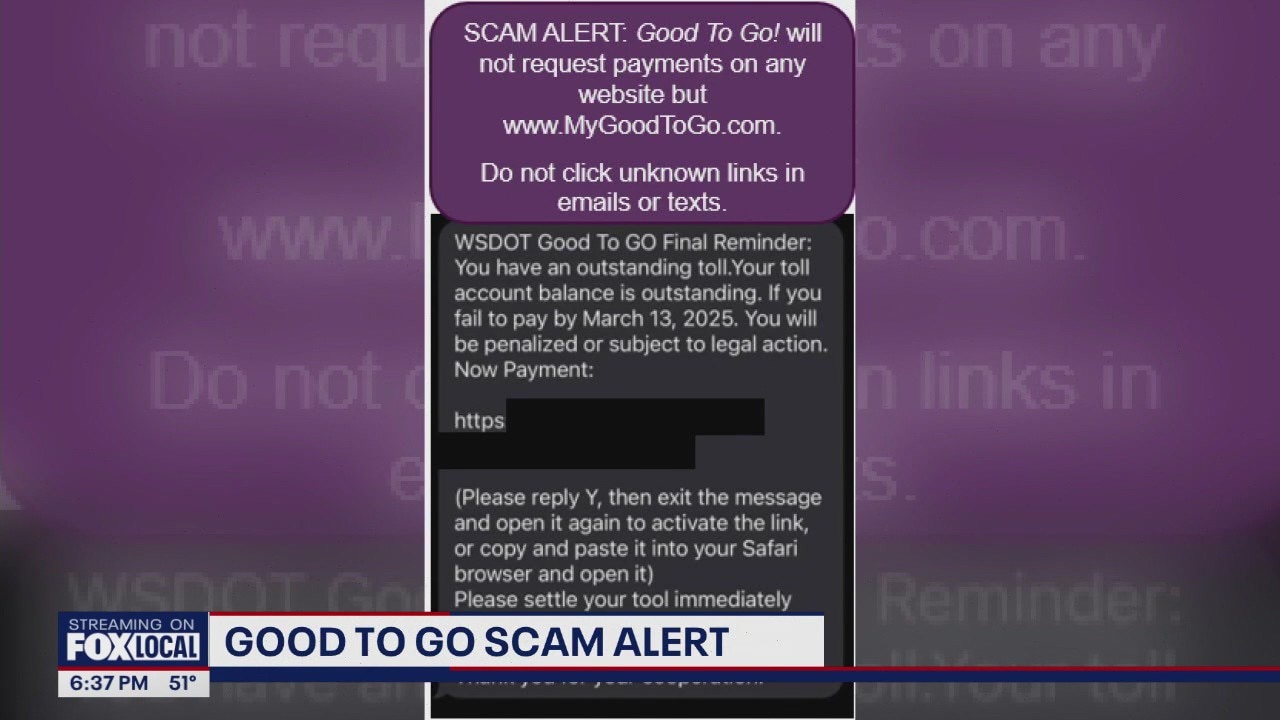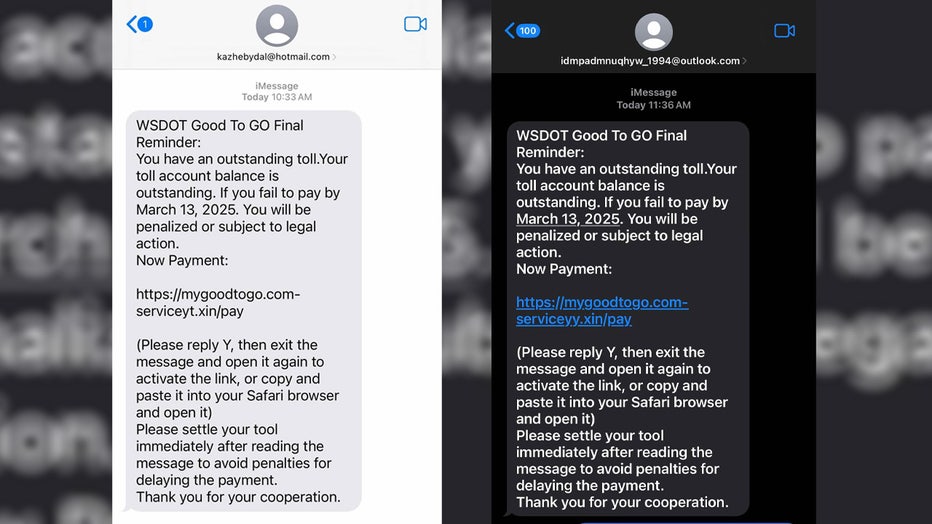FBI urges public to delete WA Good to Go text scam messages. Here's why

WSDOT warns of Good to Go scam texts
Fake texts warning of overdue bills for tolls, asking for payments or threatening legal action were sent to many people's phones on Wednesday.
SEATTLE - The FBI and the Washington State Department of Transportation are warning residents about a new Good to Go text message scam targeting people in the U.S. and parts of Canada.
Keep reading to learn more about the WSDOT Good to Go text scam and what to do if you receive a message.

Screenshots of scam text messages.
What is the new text message scam WSDOT is warning residents about?
WSDOT announced the fake text scam on social media Wednesday morning.
"We’re getting reports of fake texts warning of overdue bills and asking for payments or threatening legal action," WSDOT said. "These aren’t from Good To Go! and link to a fake website."
WSDOT is urging users not to click on the link to the fake website. Customers are also encouraged to visit WSDOT’s website, MyGoodToGo.com, to verify if they have a bill due.
What are 'smishing' texts, and how are they targeting users?
According to the FBI, these SMS texts, also known as "smishing" texts, are targeting iPhone and Android users across the United States.
The FBI is warning anyone who receives these texts to delete them immediately.
As reported by FOX 5 DC, cybersecurity firm Palo Alto Networks' Unit 42 reports these latest threats involve the creation of over 10,000 domains with a consistent naming pattern, which are being used in potential smishing schemes. These scams impersonate toll services and package delivery companies in multiple U.S. states, including Virginia, California, Florida, Illinois, Kansas, Massachusetts, Pennsylvania, New Jersey, New York and Texas, as well as the Canadian province of Ontario.
The scam aims to trick people into revealing sensitive personal and financial data, such as credit or debit card numbers and bank account information.
The new scheme also targets iPhone users by exploiting a feature that blocks links in iMessages from unknown contacts. To bypass this security, the scam texts instruct recipients to reply with a "Y" and reopen the message, which allows iMessage to display the malicious links, according to Palo Alto Networks.
Which U.S. cities are most affected by toll road smishing scams?
According to McAfee, an antivirus, identity and privacy protection company, the U.S. cities facing the biggest influx of toll road scams include the following:
- Seattle, Washington
- Dallas, Texas
- Atlanta, Georgia
- Los Angeles, California
- Chicago, Illinois
- Orlando, Florida
- Miami, Florida
- San Antonio, Texas
- Las Vegas, Nevada
- Houston, Texas
- Denver, Colorado
- San Diego, California
- Phoenix, Arizona
- Indianapolis, Indiana
- Boardman, Ohio
The Source: Information for this article came from the Washington State Department of Transportation, the FBI, McAfee and FOX 5 DC.
MORE TOP STORIES FROM FOX 13 SEATTLE
Seattle radio legend Bob Rivers dies at 68 after cancer battle
Missing Oregon toddler found dead in Siletz River, authorities confirm
Father 'deeply concerned' for British cartoonist locked up at Tacoma ICE detention enter
Fire destroys, damages multiple Cybertrucks in Seattle lot
Bryan Kohberger defense ramps up legal maneuvers in bid to keep Idaho murders suspect off death row
To get the best local news, weather and sports in Seattle for free, sign up for the daily FOX Seattle Newsletter.
Download the free FOX LOCAL app for mobile in the Apple App Store or Google Play Store for live Seattle news, top stories, weather updates and more local and national coverage, plus 24/7 streaming coverage from across the nation.

